| Clutching My Pearls is about Jane Austen and the times she lived in. Click here for the first in the series. |
| Content advisory: If reading about attempted sexual coercion in any context is uncomfortable or traumatic for you, please be advised this post discusses novels which featured heroines in peril, a common trope in melodrama. |
| | A popular heroine trope of the past also involves refusal; in this case, the refusal to surrender one's virtue. The virtue of the heroine was of singular and unremitting importance in dramatic literature. Entire plots could hinge on the question of whether the heroine remained unsullied. Thus, when faced with dishonor, these proud heroines unhesitatingly chose to face death instead. Whether the situation is presented dramatically or comically, (as in satire or parody,) the heroine usually escapes and is reunited with the man she loves. |
The Sultan commands her to love him and threatens her with torture if she refuses. In the aria Martern aller Arten she responds that she chooses "every pain and grief." "Command, coerce me, roar, fulminate, rage. Death will liberate me in the end."
“'Forbear, my Lord,' [Louisa cries] 'unless you mean to add my death to your other crimes, (catching the scissors from the tambour frame that stood by the sofa); for I will sooner deprive myself of life than be the wretch you would have me.'
“'Whether he thought my words greater than my courage, I know not; but he would have proceeded in his infamous intent. In that moment of horror, raising my hand, I attempted a blow at my breast; but hastily throwing his arm round my neck, he received the stroke. As he bled extremely, it obliged him instantly to loose me; though swearing I should not escape him.'”
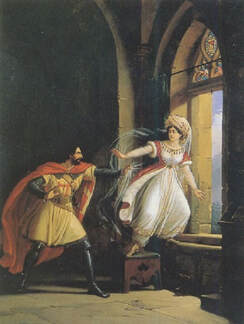
“Submit to my fate!” said Rebecca... "Craven knight!—forsworn priest! I spit at thee, and I defy thee…"
As she spoke, she threw open the latticed window…[and] stood on the very verge of the parapet, with not the slightest screen between her and the tremendous depth below… “Remain where thou art, proud Templar… one foot nearer, and I plunge myself from the precipice; … While Rebecca spoke thus, her high and firm resolve, which corresponded so well with the expressive beauty of her countenance, gave to her looks, air, and manner, a dignity that seemed more than mortal."
..."As she spoke this, she clasped her hands and extended them towards heaven, as if imploring mercy on her soul before she made the final plunge. The Templar hesitated, and a resolution which had never yielded to pity or distress gave way to his admiration of her fortitude. 'Come down,' he said, 'rash girl!—I swear by earth, and sea, and sky, I will offer thee no offence.'”
More trials (including a trial for witchcraft) await Rebecca and she doesn't even get Ivanhoe in the end.
Castalia's "face was white as death to the lips, an unutterable horror was on it, but no yielding fear.... 'You will save me,' she murmured to the water, 'There is only one pain in dying--to leave the world that has his life.' She swayed herself lightly, balancing herself to spring with unerring measure to where the eddy of the torrent was deepest."
She is rescued by the intervention of an old blind man. Later, Castalia's true parentage is revealed and she is united with Chandos.
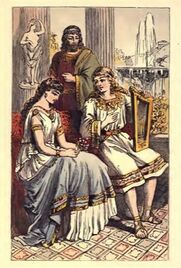
“'Hear me!' said Ione, speaking firmly, and with a deliberate and solemn voice: 'I cannot wed with thee. Interrupt me not: but mark me, Arbaces! If Glaucus die, on that same day I baffle thine arts, and leave to thy love only my dust! Yes—thou mayst put the knife and the poison from my reach—though mayst imprison—thou mayst chain me, but the brave soul resolved to escape is never without means. These hands, naked and unarmed though they be, shall tear away the bonds of life. Fetter them, and these lips shall firmly refuse the air.'"
Ione and Glaucus survive the eruption of Mt. Vesuvius, while Arbaces is struck down by lightning.
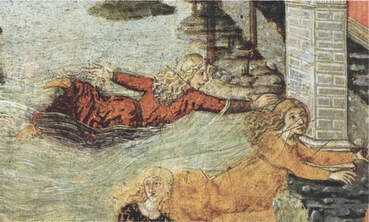 Cloelia escaping the Etruscans
Cloelia escaping the Etruscans “It is now, my fair companions,” said she, with a solemn accent, "that the Destinies have furnished you with the opportunity of displaying, in a manner truly heroic, the sublimity of your virtue, and the grandeur of your courage, to the world. The action that we have in our power to perform will immortalize our fame and raise us to a pitch of glory equal to that of the renowned Clelia herself. Like her, we may expect statues erected to our honour…” and so saying, she jumps into the Thames. (She survives, and is brought to her sense by a kindly doctor.)
Arabella is referring to Cloelia, a legendary Roman girl who was taken captive but managed to escape by swimming the Tiber, and helped other young maidens to escape.
The Female Quixote was published in 1752. This comic tale is best remembered today as an inspiration for Jane Austen’s Northanger Abbey. Austen borrowed the premise of a heroine drawing her notions of life from the novels she reads. In addition, Austen added a light-hearted parody of the damsel in distress. In one of Austen's favourite novels, Sir Charles Grandison, Harriet Byron is abducted by a wicked nobleman and rescued by the hero before the nobleman can have his wicked way. In Northanger Abbey, this idea of abduction is echoed when John Thorpe deceives Catherine and takes her for a carriage ride against her wishes.
While Charlotte Lennox carries the premise of the deluded heroine all the way through to the final chapters of the Female Quixote, Austen brings Catherine Morland down to earth partway through Northanger Abbey. She created another self-deluding heroine in Emma, but in a more natural situation and setting.
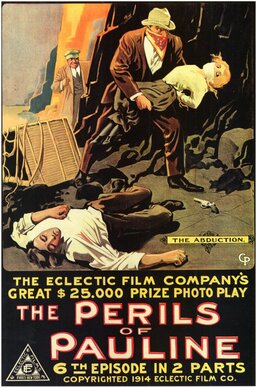
The rest of Sanditon seems so very modern; a story about an entrepreneur's efforts to turn a quiet village into a prosperous seaside resort. Where was Austen going with the seduction story? The indications are that Austen planned a subplot that would be either an exploration or more likely, a parody of the damsel-in-distress trope. Is Sir Edward intended to be strictly comic or are we meant to be actually apprehensive for Clara?
Austen tells us immediately that Clara sees right through Sir Edward and had no intention of being seduced. She also tells us that the novel's presumptive heroine, Charlotte Heywood, "could see in [Clara] only the most perfect representation of whatever heroine might be most beautiful and bewitching in all the numerous volumes they had left behind on Mrs. Whitby's shelves. Perhaps it might be partly owing to her having just issued from a circulating library but she could not separate the idea of a complete heroine from Clara Brereton. Her situation with Lady Denham so very much in favour of it! She seemed placed with her on purpose to be ill-used. Such poverty and dependence joined to such beauty and merit seemed to leave no choice in the business."
Charlotte is emphatically a very level-headed young woman in the fragment. Austen specifically tells us she is "sober-minded." But is Austen setting her up here for self-delusion? It seems like a mixed message.
Did Austen intend to turn the tables with Clara Brereton, who appears to be an angelic heroine, and reveal her as an unprincipled schemer? She certainly gives a lot of emphasis in the fragment to how Clara appears to be everything that is lovely and virtuous.
Is Sir Edward redeemed in the end? That seems unlikely, based on how Austen portrays him.
I for one, can't figure it out.
| Authors of the 18th and 19th century often resorted to "thee" and "thy" in moments of high drama. In A Different Kind of Woman, the third book in my Mansfield Trilogy, the writer William Gibson entertains little Betsey Price with an impromptu story featuring an exotic native Princess. She objects, though, when he uses "thou" and "thy" instead of "you" and "your." Click here for more about my books. |
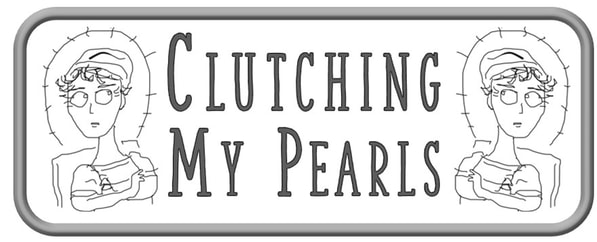
 RSS Feed
RSS Feed